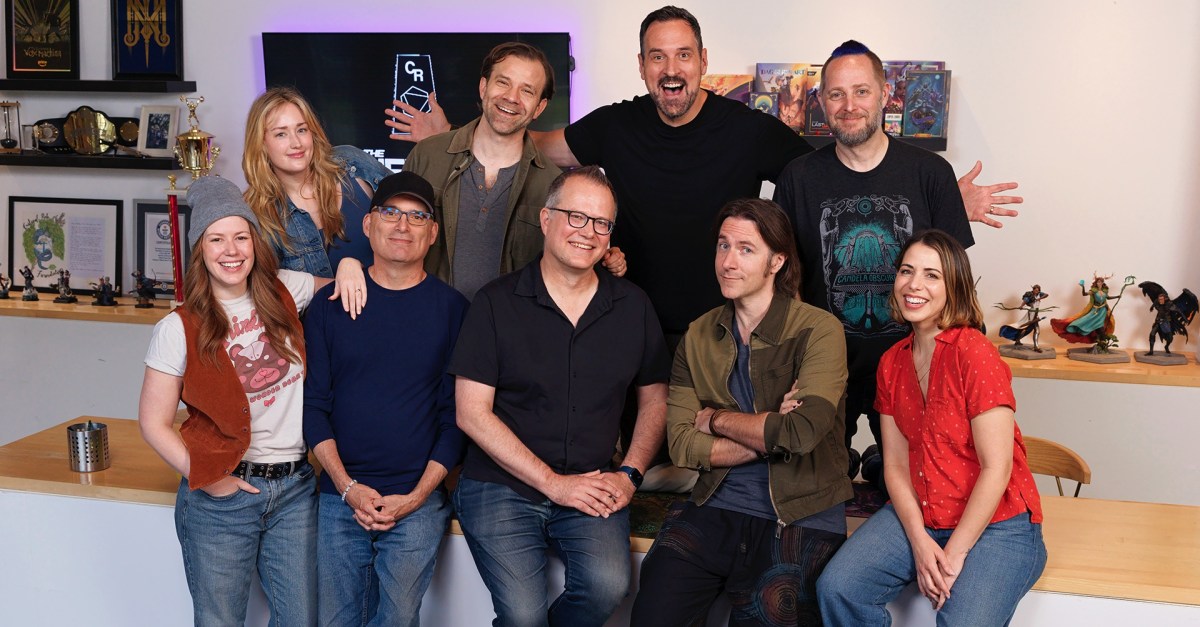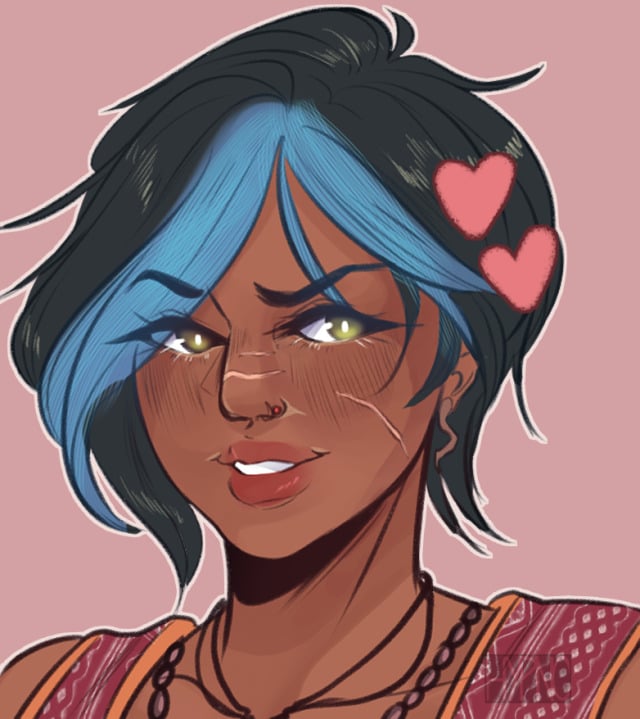I love Christ Perkin and Jeremy Crawford. Who is even running D&D now? They are literally the only people I knew still on the project. They are both great. Were they forced out of WoTC?
Chatgpt probably
ChatGPT give some pretty generic DnD advice. I can’t wait until they make a terrible automated DM. I can’t wait to play the most generic DnD of all time.
Every single game is just the plot of Monty Python and The Holy Grail.
That would be fun. Every game would just be a series of different fetch quests with a rotated list of the same enemies. Like a MMRPG but worse and more expensive
“the corporation” is running it now. It’s not about people any more, it’s all procedural and goal oriented operations now.
Gross. I was really excited for 5.5 for a while but don’t really want to get it anymore. I liked the PHB class upgrades when I read it but don’t own anything from it yet
5.5, in my opinion, is a very corporate edition of the game. There wasn’t any actual change or reason for a new edition other than Hasbro wanted D&DBeyond and the money it got, and the way to do that was make a “new edition”. But people liked and were playing 5e so, make a backwards compatible system that’s totally the same thing.
The 2024 version of D&D, in my eyes, doesn’t fix any of the actual issues with the game. They change some wording and change some abilities but none of the core issues are dealt with. So to me, it’s a pointless cash grab.
I like the changes with weapons properties and I like some of the updates with various classes for some improvements to the weaker subclasses and feats. I overall enjoyed the majority of the changes.
However, from what I have heard and seen I did not enjoy the changes to the Monster Manual and statblocks.
I pick crit role every time, those goddamn Wizards lost the plot. They got Rincewind at the damn helm.
Good. WotC is wretched hive of scum and villainy.
Good,
WotCHASBRO is a wretched hive of scum and villainy.FIFY
Either way, the money grab is why I didn’t get back into MtG recently.
I considered sticking my toe in and was told “oh yeah, just buy a $90 commander precon and hop right in.”
Yeah, no thanks.
Impossible to find without a markup of at least 40% if a final Fantasy commander
WotC did some shady shit before, too. Certainly right improve since the acquisition though.
Aren’t Hasbro the villain moreso than WotC?
People have been complaining about WotC’s executive meddling in D&D and MTG for as long as I can remember, since before the 1999 Hasbro purchase. D&D 3e, mostly written after WotC acquired TSR but published shortly after Hasbro acquired WotC, was panned so badly that they dropped 3.5 just a couple years later. And 4e (including the first OGL fiasco) happened when Hasbro didn’t care about WotC because they were all-in on the Michael Bay Transformers movie. In fact, up until Stranger Things and Critical Role, Hasbro seems to have considered WotC the “Magic: The Gathering Money Printer” and done most of their meddling on that side of the house.
I organized pen and paper RPG conventions back when D&D 4 came out. We banned D20 based games even then as a boycott of WotC.
From what I’ve read WOTC has been a bad employer for a long time.
From my understanding, they used to basically be the same as Games Workshop is today: If you talk to people who work there “off the record” (or they are pushing the equivalent of a youtube channel… shout out to Rogue Hobbies) you’ll either get outright condemnation or LOTS of vague posting of a culture of theft and abuse.
But recent years have seen people get annoyed enough at the products that they now care about labor and we start to see a LOT more complaints.
Depends on who you talk to. I always thought the atmo was pretty chill. When I was there around 2010 as a contractor for a couple years they had a strange work schedule: 9-hr days Mon-Thurs and half day Friday - which was almost universally regarded as a screw-around day, along with at least half of Thursday.
Thanks for providing your view! I had only read the mostly negative reviews on job sites when I was thinking of applying around 2015ish.
WotC+D&D is like ~30-40% of Hasbro. The only other brand they have that’s worth a similar amount is (ironically enough lmao) Monopoly.
The problem for Hasbro is that, right now, the company doesn’t have that much in non WotC moneymakers and hasn’t had it for years. There have been attempts by activist investors to push for having WotC demerged from Hasbro so WotC isn’t subsidizing the rest of Hasbro. The across-the-board cuts were Hasbro leadership trying to placate investors, but they cut muscle and bone from WotC for some reason instead.
I mean, sure, but it’s like pulling the WotC mask off a Scooby Doo villain.
And Crawford is an incompetent smartass. I honestly don’t know what any TTRPG would have to gain from including him in the team.
If they hope to chase 5e’s success by following in its footsteps - piss poor adventure modules, nonexistent DM support, unbalanced player options, and a game designer that contradicts himself on Twitter every other post while attempting to explain why he isn’t wrong - then good luck to them, I guess.
I very much doubt that 5e became the juggernaut that it’s now because of Crawford. If anything, it’s despite of him - mostly because of the free publicity granted by things like Critical Role and Stranger Things, and DnD being the default option for anyone who develops an interest in roleplaying for the first time.
How much do we actually know about what Crawford is like outside of the WotC machine? He might be perfectly competent but held back by executive mismanagement.
I would put money on the downfall of WotC being exclusively due to being owned by Hasbro and their executives forcing their greedy practices onto the team.
WotC was already pretty awful before the Hasbro acquisition, as I recall.
Internally, yea, but I was speaking more towards the decline of their products, not the treatment of staff, that was being discussed in the top comment.
Yeah, I guess that’s pretty subjective overall. In any case, they’re not so great now.
Crawford worked on Blue Rose, Warhammer Fantasy, and Mutants & Masterminds outside of WotC.
Ok, I’m not familiar enough with any of those to know what that means in this context. But in any case, weren’t his contributions to those games all ages ago? M&M in particular came out almost 30 years ago, right?
Why?
Sending The Pinkerton’s off to intimidate a YouTube reviewer
Everybody who was passionate about games have left and been replaced by money-grabbing opportunists who only want to inflate the stock value, bail out and get their severance pay.
I don’t have links to it at the moment (I’m prepping dinner… so excuse the laziness 😅) but if you search “D&D controversy” or “OGL” you’ll find plenty of discussions and analysis.
In short: they tried (but are still attempting to) bring micro-transactions and loot box mechanics to tabletop games.
Shoutout to Chris Perkins! I got to help playtest parts of 5E back in the day and he was the DM. Getting paid to play D&D is nice work if you can get it!
Perkins is the GOAT !
It’s when I started watching Acquisitions Inc that I realized how much I could improve as a DM 🤣
I picked up so much tricks and techniques just watching him run these games
I really hope they’re not putting their weight behind Daggerheart long term. That whole hope and fear system is so unappealing.
It’s interesting and it seems like a good change for people that have done a lot of d&d but it’s probably not going to be a complete replacement for 5e. It seems good for short campaigns but it only has one book out for now.
long term
If you can remember THACO, tabletop games have survived needing to change a few systems in the past
I don’t need to remember it. I’m in the middle of replaying Baldur’s Gate 1. But that was more of a complicated math formula to derive something that we can do much more simply. The hope and fear thing not only reminds me of that scam curriculum in Donnie Darko, it also doesn’t feel like an interesting tactical layer; it does the opposite by interfering with initiative in a way that I’m not a fan of.
I’ve never ran it, but what don’t you like about it?
It’s rooted in the light/dark side of the force from Star Wars tabletop, and kind of inherent to Star Wars is making out everything in the world to be light or dark as though it’s that simple, but hardly anything in life is.
I have never seen hope/fear described as light/dark from star wars, and I’ve read the Daggerheart rules.
It came from here.
I can see why the comparison to Genysis would exist now but I don’t think it’s a very worthwhile comparison to make in how they play out and are used in each system.
I don’t think any designer has ever said it is from Star Wars, and it most definitely does not use them as Light Side/Dark Side or imposed morality. It’s inspired by the Genesys rpg system of degrees of success/failure and has narrative effects like “Yes, but” and “No, however”.
I’d seen it written up in other articles as coming from Star Wars, so perhaps it was that writer that was mistaken. I’ve watched them play, heard the rules explanations and such, and “yes, but” and “no, however” to skill checks aren’t solving some problem I’ve had in other systems.
It comes from the FFG Star wars RPG system and its method of creating multiple success/failure conditions. It’s an entirely independent system to the light/dark side force mechanics.
That’s fair if it’s not solving a problem for you, but it does add something new that resonates with a lot of people (at least it did for me). I’m speaking from the Genesys side so I don’t know how daggerheart handles it, but I absolutely loved it. I found it made skill checks more collaborative, my table would suggest ideas for how to interpret the roll, and having more to ‘explain’ got people more descriptive in how they talk about their actions. We went from ‘I take a swing. Nope, that’s a miss’ to ‘failure with advantage, ok I go in with my axe but I can’t get through this guy’s defenses. For my advantage, I want to hook this guys shield with my axe so the next attacker gets a boost die to hit’.
It does make checks more involved, but I prefer fewer, more impactful checks as a general rule anyway.
Sure, it’s not solving anything, but IMO it’s fun giving the GM a tokenified response currency even though you pull off a success. I’ve seen a fair amount of backlash, but just feel portraying the dice mechanic as Star Wars is miles off base, when it adds a narrative prompt for success/failure (D&D does this with nat20/nat1).
I’ll grant you I’m not typically the GM. From your perspective, do you see it making things more interesting as a GM? Because as a player, it’s less up my alley, and the GM’s response currency without that system is whatever they want it to be, because they’re the GM.
It does, I think. It powers “lair actions”, gives powers like interrupting turn sequence, making multiple moves in sequence. When the GM has a pool of currency players can see, there’s an unsaid acknowledgement things are going wrong/badly, which helps fuel collaboration in the storytelling aspect. I can say that someone fails an attack, but on a fail with fear they miss the attack AND leave themselves open to a harsh counterattack, or perhaps lose their weapon. I can do all of this off the cuff in D&D because ‘GM said so’, but then the players can feel an adversarial relationship instead of collaborative, which is so much more encouraged in Daggerheart.
All entirely subjective, and at its core it’s still heroic fantasy same as hundreds of other systems and if you are put off by rolling two dice for metacurrency, it’s likely not for you.
Hopefully they fix Daggerheart’s open-license. Last I looked it was problematic to say the least.
Same. I tried looking through it and was extremely confused by what I was reading.
I just searched for updates on the matter and found a Lemmy post with a youtube video.
You know, I’m not surprised about that, and not in a good way. CR is part of RPG culture I’m not good with, and I’m totally unsurprised that people who were part of 5e are joining them.
All I can hope is that seeing Hasbro lose people will draw attention to other systems - or for Hasbro to make a marketing push on the Essence20 system in addition to (or instead of) d20.
What do you mean by RPG culture that you’re not good with?
I too, am curious. I could totally be on board with this comment, or I could totally not be on board with this comment. I do agree with the latter sentiment. There are some very creative and well thought-out systems out there.
I’m sorry, I only feel like typing it once, please look up-thread, or here:
https://kbin.melroy.org/m/games@lemmy.world/t/995294/-/comment/7944352
This link goes to some login page for me when I click it
Back on PC now, copying it:
The commodification and the desire for mass appeal are the top-level issues I have. I feel uncomfortable when I see the modern D&D branding on stuff in “normal” stores. It takes away the community and puts Hasbro in the central role, rather than the network of GMs who should be the majority influence. If I wanted a hobby with a company in charge, I would play Warhammer.
Now, on the community side, my biggest issue is with things I see as derived from CR. The lack of respect for simple theatre of the mind is a direct issue with the way I’ve always run and played since I left D&D. The tolerance and even acceptance of paid DMing also pisses me off in ways that make it very hard for me to remain civil.
Those are the big ones. There’s also the fact that D&D doesn’t seem to have the offramps it had since AD&D1 (and which admittedly went downhill when the Forge went out of the spotlight).
Could you elaborate on the aspects of the RPG culture you have a problem with? I’m just curious.
The commodification and the desire for mass appeal are the top-level issues I have. I feel uncomfortable when I see the modern D&D branding on stuff in “normal” stores. It takes away the community and puts Hasbro in the central role, rather than the network of GMs who should be the majority influence. If I wanted a hobby with a company in charge, I would play Warhammer.
Now, on the community side, my biggest issue is with things I see as derived from CR. The lack of respect for simple theatre of the mind is a direct issue with the way I’ve always run and played since I left D&D. The tolerance and even acceptance of paid DMing also pisses me off in ways that make it very hard for me to remain civil.
Those are the big ones. There’s also the fact that D&D doesn’t seem to have the offramps it had since AD&D1 (and which admittedly went downhill when the Forge went out of the spotlight).
The lack of respect for simple theatre of the mind is a direct issue with the way I’ve always run and played since I left D&D.
What do you mean by this?
The tolerance and even acceptance of paid DMing also pisses me off in ways that make it very hard for me to remain civil.
Why? Running a game is work, and not every group that wants to play has a good GM. How is it any different than commissioning art of your character or buying an adventure module? Don’t get me wrong, I prefer unpaid friends, but I’m blessed with multiple potential GMs in my group. Not everyone is so lucky, do they just not get to play? Or are they forced to nominate a GM who won’t enjoy it and won’t run an enjoyable game?
What do you mean by this?
I mean that every time I’ve tried to run a game, either on tabletop (exceedingly rare now) or online, the demands from players are ridiculous compared to my expectations and what I set out as my intentions. I am not a voice actor. I’m decent at improv, but sometimes do need a moment to contemplate. I do not use images, music, battlemaps, miniatures, or any other equipment. Just dice, words, and imagination. This has gone from being the standard mode of play in the communities I’m accustomed to into a very niche thing that no one seems interested in anymore.
[Defense of Paid DMs]
At best, we’ll have to agree to disagree. I’m going to address the points I think I can without overcoming apoplexy first.
There are hundreds if not thousands of GM guides available. If you cannot or will not put in that level of investment, then run something GM-less, or work together to GM the game. Gary called DMs ‘referees’, and I think that model still holds up - no ref in a game is responsible for the whole field at every moment. Real referees switch up and have things like VAR or other systems. If one guy in the group is good at designing traps, let him design the traps and run them. If one person is good at storytelling, let them present the story. The person who knows combat best should adjudicate it. This is a game of cooperative fun. So, cooperate. Either that, or try something like Fiasco, Shadowrun Anarchy, Microscope, Space Bounty Blues, or something like that, and then move into refereeing a rules-light system like The Black Hack or a PbtA. Don’t be hemmed in by modern D&D (note that this ties into the ‘D&D has fewer offramps’ point above).
As far as the paid DM part, it’s very simple: This is a creative hobby. This is the time we have free together as friends, and RPGs have been some of the very few things in my life that has been an escape from the soul-crushing burden of working and money changing hands for every damn thing. Paid DMs turn it into a business, not a fun experience, and I consider their existence toxic to the community. Because after all, if some other schlub is making money doing a thing, why shouldn’t I charge money to do that thing? Why should I be the one doing free labor? And that’s the problem. It turns what should be creative, cooperative, storytelling with guard rails into a discussion of labor and capital and investment and all the crap that I want to avoid in the world via the escapism of RPGs. That paid person isn’t my friend anymore, he’s a paid service provider. But what KPIs is he measured by? ‘Fun’ isn’t quantifiable (much to Friend Computer’s chagrin), so, what? XP per session? Loot? Some other valueless measure which inevitably means nothing?
In short - no. I will reiterate, I believe that paid DMing is toxic to the community as a whole. It turns what should be an exercise in building and developing friendships into building and developing a business. It takes the party away from being a group of friends or fellow-travelers into a group of customers receiving shared service from a provider. It’s no different from the people you meet at the big table of a hibachi restaurant.
That’s before we get into how incredibly elitist it is by definition. Paid DMing takes away from the grassroots elements of the game. It puts a paywall between the player and the game. Any of the paid DMs I’ve seen have their players basically sign non-compete agreements, so they can’t just turn into a normal group without that DM - which means those players don’t join the larger community. So in every way I can oppose it, in every way I can hate it, I do.
I don’t despise paid DMing as much as you do, but I agree that it’s negatively shifting the expectations of hobbyist/enthusiast DMs and commodifying what was originally a personal investment into a social group.
In addition, a paid DM is more inclined to make conditions favorable for the players… as they do not want to get fired from that role.
It’s true that DMing can be hard work and that the DM will spend many more hours on DnD than anyone else in the group, but last time I DM’ed, my friends ran a food rotation (usually big macs or taco bell) and I always ate for free :)
Burgers won’t make me fudge dice to keep the party happy, but a paycheck sure would.
I mean, this just seems really gatekeepy. You’re obviously allowed to play however you like, but I don’t see how the way others play affects you.
the demands from players are ridiculous compared to my expectations and what I set out as my intentions
That sounds like a communication issue. I’ve played fully tactical with battle mats and set pieces, and I’ve played fully theater of the mind, and I’ve never had an issue with player expectations as long as I communicate my intentions pre-session zero.
As far as the paid DM part, it’s very simple: This is a creative hobby.
So is art, so is adventure design. I still don’t see how it’s different from commissioning art of your character or buying a module.
Why stop at DM? Every group should invent their own system, carve their own dice, design their own adventures. It’s not very grassroots to use a system designed by an elitist corporation.
I’m into 3d printing. When the hobby started, there were not commercial printers, you had to build one from scratch. Are we supposed to hate manufactured printers to preserve the creative integrity of the hobby?
I just don’t see the rationale of your preferences for how you like to play metastasizing into hatred. You’re allowed to play how you want, so is everyone else.
I’m in a mood right now, so I’m just going to cherry-pick. I’ll come back and give you a better response when I’m in a better mindset.
It’s not very grassroots to use a system designed by an elitist corporation.
You’re absolutely right. D&D past AD&D1 should never have been the center of our hobby.
You’re absolutely right. D&D past AD&D1 should never have been the center of our hobby.
Oh I switched to GURPS years ago. I don’t think D&D is a particularly good system for anyone with any real TTRPG experience, but 5e is actually pretty accessible as an introduction to the hobby. Plenty of canon content to work from, or just buy modules from, and it’s fairly simple to play. Plus D&D is the OG, so it’s the default TTRPG in media.
And I’m fine with media. I like media, temporarily. It introduces the hobby to people who might otherwise remain at a perpetual distance, and while a lot of them aren’t really right for TTRPGs, some of them are, and I’m happy they were introduced to it.
The reason I don’t mind paid DMs is because the people that want them are new to the hobby, probably a whole group worth. The alternative is that they elect one of their own; personally I’m down with sharing the GM’s chair, but I don’t think it’s practical for most newbies without an experienced GM present.
Now someone totally new has to figure out how to run a game, and odds are they’re going to suck a bunch, and that’s going to lead to a game that sucks a bunch, and everyone’s going to think D&D actually sucks, and all TTRPGs as well by extension. Players who might, under an experienced GM, see what it can be, will see it instead as a trainwreck.
The market for paid GMs is newbies, and I don’t mind it. This isn’t the 80s, there’s other stuff to do if their first campaign sucks. I don’t mind paid GMs as the starter to get a group moving. Once they get a little wind in their sails one of them will step up and adopt the mantle.
Especially since I assume a decent GM is probably in the neighborhood of $100/session, so about $25/person for a party of four. I think that the instant one of them feels confident to give it a go, they will have that conversation.
Sure, there might be a bit of an expectation adjustment, as you said, but that actually seems easier to accommodate. It would be obviously unreasonable for the party to expect, for free, the same experience they were previously paying $25/person/session for.
And even if they don’t, and they keep the paid GM, it’s not like WOTC has a DM Uber app. Those aren’t corporate stooges, they’re experienced enthusiasts like yourself getting a little kickback for the years of development they’ve dedicated to their craft. I’d reckon a fair segment of the people who would take the job are veteran GMs with no parties to play with. They benefit doubly.
I just think new players in the modern age benefit more from a good first impression of the hobby, and the cost provides a natural incentive for the unpaid alternative to evolve.
TLDR I liked dnd before it was cool
Nah, it was always cool. It just wasn’t mainstream and turned into a business.
Paid DMing infuriates me.
Thank you for the reply. I was really into D&D a few years ago but my interest decreased when life shifted. I missed those days.
Ok now do Magic
They got the good ones
















